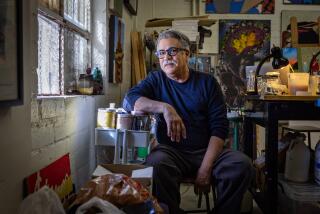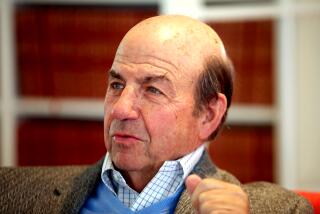Diana Trilling; Literary, Cultural Critic and Author
- Share via
Diana Trilling, a literary and cultural critic, essayist and author known for her direct and uncompromising insight and prose, has died at age 91.
Trilling, the widow of fellow intellectual and writer Lionel Trilling, died Wednesday in Columbia Presbyterian Hospital in New York.
A lifelong New Yorker, she was held in high esteem by scholars and selective readers around the world.
“To the extent that America has an intellectual conscience, Diana Trilling is part of it,” Elizabeth
Janeway once wrote for the Los Angeles Times Book Review. She is “a literary critic who knows that literature can’t be understood apart from its context in social, cultural and political life. She has been disagreed with, but no one has ever thought her opinions shabby, easily come by or uninteresting.”
Of all Trilling’s books and articles, the writer earned widest recognition from the public for her 1981 analysis “Mrs. Harris: The Death of the Scarsdale Diet Doctor,” about educator Jean Harris, who was convicted of murdering popular diet doctor Herman Tarnover.
“Although her work has appeared over a period of four decades, Diana Trilling is hardly a writer with a large public,” said the Saturday Review in hailing the book. “To a certain readership, so loyal and intense one is almost tempted to call it a constituency, she is very well known indeed. These readers are the survivors and enthusiasts of the late great literary wars.”
Trilling both basked in and chafed at being overshadowed by her more famous husband. She had joked that the headline on her obituary would be: “Diana Trilling Dies at 150; Widow of Distinguished Professor and Literary Critic Lionel Trilling.”
But she credited him with her meaningful literary education and for starting her writing career. The former Diana Rubin earned a liberal arts degree at Radcliffe, later marveling that she did so without reading a line of Shakespeare, Chaucer, Dante and many other writers of classic literature.
She met Lionel Trilling at a New York speak-easy in 1927 and quickly fell in love. “Surely,” she later confided, “going to bed with a man before marriage was the most courageous act of my life.”
They were married in 1929 and became known as “Li and Di” in their circle of intellectuals, which included Irving Howe, Sidney Hook, Hannah Arendt, Saul Bellow, Mary McCarthy and Irving Kristol. The circle debated, usually in print in prestigious magazines, such issues as whether the United States should enter World War II, McCarthyism and Iranian Ayatollah Ruhollah Khomeini’s order to execute novelist Salman Rushdie.
Both Trillings flirted with communism in the early 1930s but became staunch anti-communists when Josef Stalin gained power in the Soviet Union.
When Lionel Trilling was asked to suggest a book reviewer for the Nation in 1941, he launched his wife’s writing career by naming her. She continued writing for more than half a century, recently completing her final book, “A Visit to Camelot,” about an evening in the White House when John F. Kennedy was president.
In 1993, unable to see to write, Trilling dictated her memoir, “The Beginning of the Journey: The Marriage of Diana and Lionel Trilling.”
Reviewing the book for The Times, Richard Eder said Trilling’s rambling account veered into endless detail and indicated that she should have decanted her life years earlier. Nevertheless, he described the memoir as “pure moving lyricism.”
Among Trilling’s books were “Reviewing the Forties,” a collection of her book reviews for the Nation when she read a novel a day, and “We Must March My Darlings,” a collection of essays contrasting Radcliffe students of the early 1970s with those of her own era.
Over the years, Trilling also wrote for the New Yorker, Atlantic, Saturday Review, Commentary and Partisan Review.
She edited two volumes on D.H. Lawrence and 12 volumes of her husband’s work after his death in 1975.
Trilling is survived by a son, James, of Providence, R.I., and two grandchildren.
More to Read
Sign up for our Book Club newsletter
Get the latest news, events and more from the Los Angeles Times Book Club, and help us get L.A. reading and talking.
You may occasionally receive promotional content from the Los Angeles Times.










